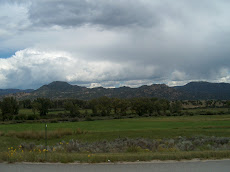I wasn't planning on doing the Jungle Jog, so I didn't play it up for y'all, which turned out to be a good thing. The positives were that it was a Rochester Runner of the Year race, ensuring a good turnout; it included a jaunt thru the zoo during the race; and it fit in nicely ahead of Chlesea's grad party. Since grandpa and uncle Tim were running, I decided to head up. Zach and Luke were excited to try their first 5K and 1-mile races, respectively.
The negatives were too plentiful: my calf was too sore to race; there was thunder just before the race and a downpour just after the start; the timing system was messed; there was a stretch through the zoo parking lot, that had no course markings whatsover - everyone made up their own course; and they started the 1 mile fun run 7 minutes too early. There are many races from which to choose, I don't race nearly as ofter as I did in the past - what's the likelihood that I will return?
So, what lessons are there to be learned?
First, I am a wuss who relies on rationalization. If I'm not well enough to race, I am not well enough to run along with Zach and Luke. Conversely, if I was well enough to run with the boys, I should have been well enough to race. In this case, don't "Be Like Mike".
Second, race organizers cannot get away with "phoning it in", even after several years of successful (?) race management. There were too many blown details for it to just be a bad day. Perhaps most runners don't expect better organization, and this race will not suffer in future years, but for me, one bad experience will tend to make me check out another race instead.
Third, we can learn from the failure of the timing system. There is planning and there is execution. Execution errors are going to happen (time pressure, uncontrollable variables, human error, etc.); the planning has to cover the contingencies. They had a fancy electronic system, with wires in the race numbers. And a fancy backup system where a guy manually waved a wand-ish device over the numbers to capture the data. And the results were wrong. Where was the manual backup system - someone just writing down numbers in the order of finish? I love computers. At our US Orienteering Champs meet a couple of months ago, we had a fancy electronic timing system. And we had a backup computer-automated timing system, but we also had a manual pencil and paper system ready, just in case.
Fourth, we can learn from Luke's (well, my) error. They started his race 7 minutes early, with no announcement, but did we have to miss the start? No, we could have wandered by the starting line ahead of time, and perhaps noticed everyone getting ready to go. Instead, we were worried about trying to stay dry, and did so from a spot without a vantage point to the starting line. We lost focus of the race, momentarily, and paid the price.
So, this post is about preparation. It was lacking on the part of the race organizers, it was lacking on the part of the race timers and it was lacking on my part. I cannot control the first two, but I cannot allow the last. Please, be prepared for races this fall. And the way to do that is through practice. So, be prepared for practices this fall.
Subscribe to:
Post Comments (Atom)












No comments:
Post a Comment